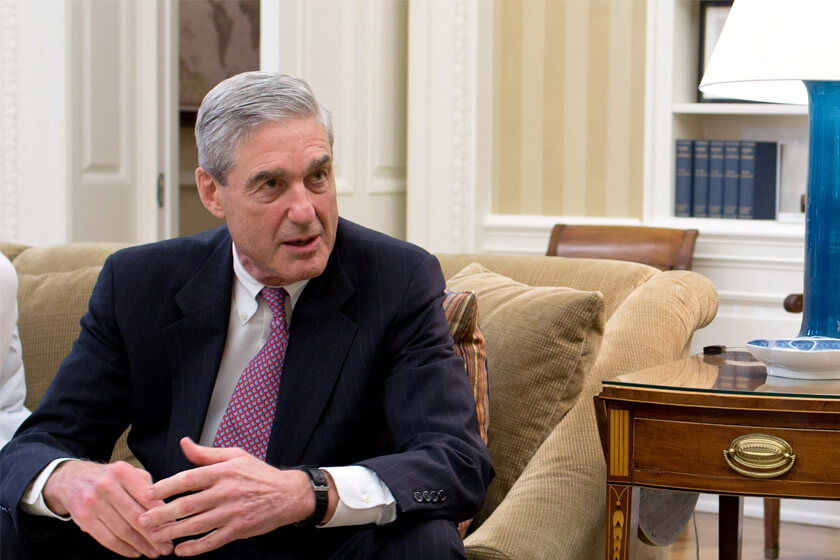West Long Branch, NJ – The Monmouth University Poll finds bipartisan agreement that Donald Trump should agree to an interview with special counsel Robert Mueller regarding the Russia probe – and he should do so under oath. Most Americans believe recent reports that Trump tried to fire Mueller last summer and they support requiring judicial review before the president could dismiss a special counsel.
An overwhelming majority of Americans (71%) say that Trump should agree to be interviewed by Mueller about the Russia probe. This includes 85% of Democrats, 74% of independents, and 51% of Republicans. If Trump agrees to an interview, fully 8-in-10 (82%) say he should do so under oath, including 93% of Democrats, 85% of independents, and 67% of Republicans.
“Democrats and Republicans alike say the president should sit down with Mueller, although they probably have very different reasons for wanting Trump to do this,” said Patrick Murray, director of the independent Monmouth University Polling Institute.
A majority of the public (58%) believes that recent reports about Trump trying to fire Mueller last summer are likely true. Just 27% say these reports are not true. There is partisan disagreement on this view, however. Most Democrats (84%) and independents (59%) put stock in these reports compared to just 30% of Republicans who believe they are true. Among those who have been following the news stories about Trump’s possible attempt to fire Mueller, 64% say the reports are true and 27% say they are not.
If Trump did in fact try to fire Mueller, 41% of the public feel this action rises to the level of an attempt to obstruct justice while 44% say the president’s actions are less serious than that. Two thirds of Democrats (66%) say that Trump trying to fire Mueller is an obstruction of justice while a larger number of Republicans (74%) say this action is actually less serious. Among independents, 44% say Trump trying to fire Mueller is an attempt to obstruct justice and 40% say it is less serious. Among those who have been following the news stories about Trump’s possible attempt to fire Mueller, 48% would characterize the president’s actions as an obstruction of justice and 42% would not.
More than 6-in-10 Americans (62%) support requiring the approval of a panel of federal judges before any special counsel could be fired by the president or attorney general. Just 29% oppose this judicial check on the president’s ability to fire a special counsel. This proposal is the basis of two bipartisan bills that have been introduced in Congress in response to the Russia probe. Most Democrats (76% support and 15% oppose) and independents (65% support and 27% oppose) favor this proposal. Republicans are divided at 44% support and 47% oppose.
“Bipartisan legislation to put a judicial check on the president’s ability to fire an independent investigator receives widespread support from Democrats and independents. However, Republicans are split down the middle, so it remains to be seen whether either of the special counsel protection bills will be brought to the floor for a vote,” said Murray.
The Monmouth University Poll was conducted by telephone from January 28 to 30, 2018 with 806 adults in the United States. The results in this release have a margin of error of +/- 3.5 percent. The poll was conducted by the Monmouth University Polling Institute in West Long Branch, NJ.
QUESTIONS AND RESULTS
(* Some columns may not add to 100% due to rounding.)
[Q1-12 previously released.]
13. Have you heard recent news reports that President Trump tried to fire special counsel Robert Mueller last summer, or haven’t you heard about this?
| January 2018 | |
| Heard | 73% |
| Not heard | 27% |
| (n) | (806) |
14. Do you think the reports about Trump trying to fire Mueller are definitely true, probably true, probably not true, or definitely not true?
| January 2018 | |
| Definitely true | 17% |
| Probably true | 41% |
| Probably not true | 21% |
| Definitely not true | 6% |
| (VOL) Don’t know | 15% |
| (n) | (806) |
15. If Trump did try to fire Mueller, do you think this action rises to the level of an attempt to obstruct justice by the president or is it less serious than that?
| January 2018 | |
| Attempt to obstruct justice | 41% |
| Less serious | 44% |
| (VOL) Trump did not try to fire Mueller | 2% |
| (VOL) Don’t know | 12% |
| (n) | (806) |
16. Would you support or oppose requiring the approval of a panel of federal judges before any special counsel could be fired by the president or attorney general?
| January 2018 | |
| Support | 62% |
| Oppose | 29% |
| (VOL) Don’t know | 9% |
| (n) | (806) |
16A. Should President Trump agree to be interviewed by Special Counsel Mueller about the Russia probe, or should he not agree to do this?
| January 2018 | |
| Should agree to interview | 71% |
| Should not agree to interview | 22% |
| (VOL) Don’t know | 8% |
| (n) | (806) |
16B. If Trump is interviewed by Mueller, should the president do this interview under oath or not under oath?
| January 2018 | |
| Under oath | 82% |
| Not under oath | 12% |
| (VOL) Don’t know | 6% |
| (n) | (806) |
[Q17-18 and Q28-33 previously released.]
[Q19-27 held for future release.]
METHODOLOGY
The Monmouth University Poll was sponsored and conducted by the Monmouth University Polling Institute from January 28 to 30, 2018 with a national random sample of 806 adults age 18 and older, in English. This includes 401 contacted by a live interviewer on a landline telephone and 405 contacted by a live interviewer on a cell phone. Telephone numbers were selected through random digit dialing and landline respondents were selected with a modified Troldahl-Carter youngest adult household screen. Monmouth is responsible for all aspects of the survey design, data weighting and analysis. Final sample is weighted for region, age, education, gender and race based on US Census information. Data collection support provided by Braun Research (field) and SSI (RDD sample). For results based on this sample, one can say with 95% confidence that the error attributable to sampling has a maximum margin of plus or minus 3.5 percentage points (unadjusted for sample design). Sampling error can be larger for sub-groups (see table below). In addition to sampling error, one should bear in mind that question wording and practical difficulties in conducting surveys can introduce error or bias into the findings of opinion polls.
Click on pdf file link below for full methodology and results by key demographic groups.




